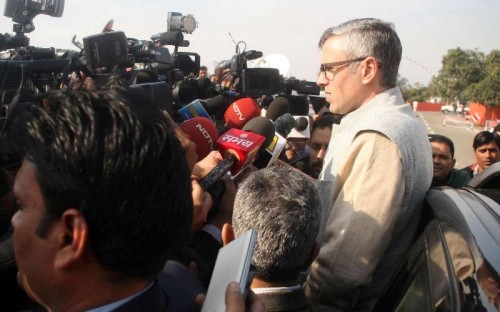
By Sheikh Qayoom
With no party in a position to form a government and with the PDP and the National Conference not too eager to ally with the BJP, is Jammu and Kashmir inching towards Governor’s Rule?
No one is sure. But equally, no one seems to know which two parties or more can come together in the hung 87-member legislature to cobble a majority.
The assembly polls threw up a hung house, with the Peoples Democratic Party winning 28 seats, the Bharatiya Janata Party a record 25, the ruling National Conference 18 and the Congress slipping to 12 seats.
Smaller parties and independents collected the remaining seven seats.
The predicament of the four major parties is understandable.
The BJP started the election campaign with a much hyped 44 plus agenda. Midway during the campaign, it revised its target and said it could garner more than 55 seats.
The PDP kept on asserting it would form the next government on its own as it expected nothing less than 44 seats, the minimum number needed to take power.
PDP spokesman Naeem Akhtar put up a brave face even when the last round of vote count was on.
The National Conference said it would win more than the 28 seats it had in the outgoing house with a better showing in the Muslim-majority Kashmir Valley. That didn’t happen.
After the results came out, outgoing Chief Minister Omar Abdullah said there was victory in defeat since many, including the media, had predicted that the National Conference would not reach the double figure.
Now the big question is: which of the parties can come together to form a government in the country’s only Muslim-majority state.
Initially it appeared the National Conference had reached some kind of an agreement with the BJP. The speculations were fuelled by Abdullah’s visit to New Delhi Dec 24.
But when Abdullah landed in Srinagar, some of his legislators came out publicly against an alliance with the BJP. There is also uneasiness in the Kashmir Valley about a Hindu chief minister.
This shifted the media focus to the PDP. When BJP general secretary Ram Madhav reached Srinagar Thursday, senior PDP leader and MP Muzaffar Hussain Baig held two rounds of talks with him.
It was then widely felt that the PDP and the BJP might shake hands after all.
But PDP spokesman Baig clarified he had met Madhav in his individual capacity and not as a PDP negotiator.
It is increasingly clear that both the National Conference and the PDP are shying away from admitting that they can stitch an alliance with the BJP. But the BJP is no more coy about its dealings with them.
This posturing by the National Conference and the PDP is likely to delay the possibilities of an early government formation in Jammu and Kashmir.
How long can the two parties refuse to admit that they may want to sail with the BJP? Can the PDP and the National Conference have an alliance with the BJP without risking loss of support in the valley? Will the two parties surmount internal opposition to forge an alliance with the BJP? Can the PDP, National Conference and the Congress join hands — to keep the BJP away, as the CPI-M has suggested?
Answers to these questions will determine if Jammu and Kashmir will have a government — or if it is heading for a spell of Governor’s Rule.